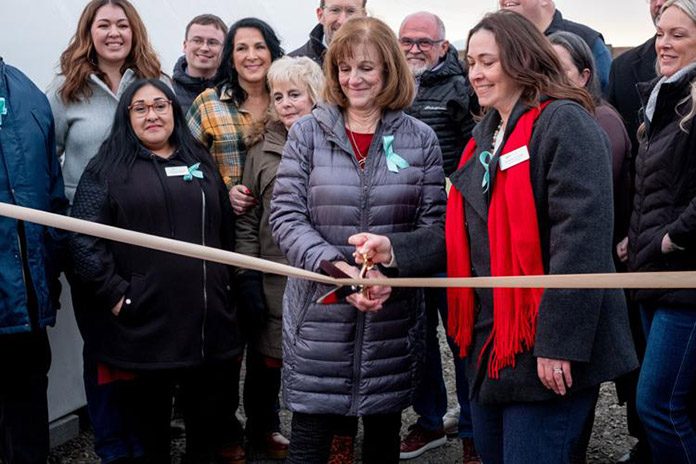
A little more than a year since its groundbreaking, Project PATH – a transitional shelter for the homeless – had its grand opening on Thursday at its location on Lind Road.
State Rep. Greg Smith and representatives from the cities of Umatilla, Hermiston, Stanfield and Echo along with Umatilla County were on hand for the ceremony hosted by the Hermiston and Umatilla chambers of commerce.
“This is a project that we’ve been working on for a long time,” said Hermiston Mayor Dave Drotzmann. “I’m super excited to see the community rally around the people who have the least among us.”
Smith said homelessness isn’t something that just happens to other people.
“Every one of us is one life event from being in a spot where we need a lifting hand, a stepping stone,” he said.

The shelter is designed to provide Practical Assistance through Transitional Housing (PATH). The intent is to bring together services to assist individuals and families facing homelessness with the objective of moving them into and through transitional housing to permanent housing.
The need for a transitional shelter for the homeless is the result of a 2018 ruling by the 9th Circuit Court in the case of Martin V. Boise. The court ruled that jurisdictions must provide a location for the homeless if community ordinances prohibit the homeless from camping in public places such as parks. In 2021, the Oregon Legislature made that ruling state law with a July 2023 deadline to implement a transitional housing program for the homeless.
Project PATH is one of eight pilot projects selected by the state to develop services for the homeless. Each pilot project is receiving $1 million from the state to develop the program. Additional funding sources have come to Stepping Stones Alliance from Amazon Web Services (AWS) InCommunities, Good Shepherd Community Foundation, the Church of Jesus Christ of Latter-Day Saints, the American Recovery Plan, Fair Housing, EOCCO, Wildhorse Foundation and numerous individual donations.
More than 150 community volunteers through numerous events helped build the 20+ Individual Shelter Units with which the center is opening. AWS and Umatilla High School collaborated to supply chairs for the shelter units, created by students working in the AWS Think Big Space.
Aside from being a donor for the Stepping Stones Center, and ahead of the grand opening, AWS also purchased the entirety of the Stepping Stones Center Amazon Wish List to provide the necessary supplies for the center to be launch ready.
The new center features a Sleep Center that will serve as a nighttime emergency low-barrier shelter for individuals and families that need a safe place to sleep for a night, along with basic food and hygiene supplies. It has a Navigation Center to provide support services such as counseling, recovery services, technology resources, and ongoing education opportunities. It also has a Housing Center with small individual shelter units for those community members seeking housing on their own and engaged in a personal action plan utilizing Navigation Center resources.
Stepping Stones Alliance, a Hermiston-based nonprofit, is managing the facilities and will provide 24-hour, seven-days a week onsite staffing to support the project buildings that include:
- Offices
- Resident showers
- Food pantry
- Community kitchen
- 21 individual shelter units that will sleep one to two people
Among the services Stepping Stones Alliance will offer include:
- Educational services including helping people earn their high school diploma or GED, counseling services to connect members with local or other traditional educational service providers (BMCC, EOU, and others), and connecting members with employer education services (such as CDL training, unemployment counselors, or workforce partnerships).
- Access to basic level medical, dental, and vision services.
- Access to transportation services to facilitate travel to work, educational programs, or other support services associated with Project PATH or deemed necessary for the member’s transition.
- Services for persons with behavioral health conditions and/or substance use disorders.
The Arc of Umatilla is another partner and will work with disabled and developmentally disadvantaged clients.

Echo City Councilor Jessica Holben thanked everyone, including the many volunteers who put in more than 1,000 hours of volunteer work constructing the 21 shelter units.
“This is a lot of work,” Holben said. “Not only physical work, but mental and emotional work. This is a big deal and it’s going to affect a lot of people for a long time.”
Umatilla Mayor Caden Sipe called Project PATH a “beacon of hope” during his remarks on Thursday.
“Hardship can happen to any of us,” he said. “We will all need a helping hand in challenging times.” Sipe said the Project PATH provides more than just a roof over someone’s head.
“It’s a sanctuary and a place of compassion,” Sipe said. He applauded the various programs designed to help the homeless gain necessary skills to move on to a life of financial independence.
Drotzmann gave credit to Umatilla City Manager Dave Stockton for his commitment to the project, as well as all the cities that have “signed on to take on the liability and success of this project.” He also thanked the various communities for their “support and goodwill.”
Not everyone in the community has been supportive of the project, noted Umatilla County Commissioner Dan Dorran.
“We need to respect the opposition we’ve heard,” he said. “Many have had valid points and concerns. We listened and heard them and now we need to respect all those concerns.”
Michael Atkinson, treasurer of Stepping Stones Alliance Board, agreed with Dorran, but reminded those in attendance that the homeless have even more pressing concerns, such as “Where will I sleep tonight?”
Dorran, and others, said the hard work is not over. The challenge going forward is to make the shelter self-sustaining.
Cathy Lloyd, chair of the Stepping Stones Alliance, said it will take a community effort to make Project PATH sustainable in the long run. Donations of food and clothing are needed, as well as volunteers.
“We grow and improve as we help others to grow and improve,” she said.
Stepping Stones Alliance Executive Director Jesalyn Cole said some more work is required before Project PATH is fully operational, including electrical, fire suppression in the shelter units and security. She said she is hopeful the electrical work will be completed in January.
Lloyd said the construction of Project PATH is the “best Christmas present I’ve ever received.” She also addressed the critics of the shelter. She said she’s heard the complaints and heard people ask why help those who won’t help themselves.
“No one wants to be homeless,” she said. “No one wants to go through garbage cans to find something to eat. Being homeless is not anyone’s personal dream.”
For more information on Project PATH, visit the Stepping Stones Alliance website.








